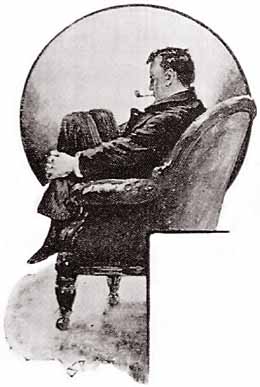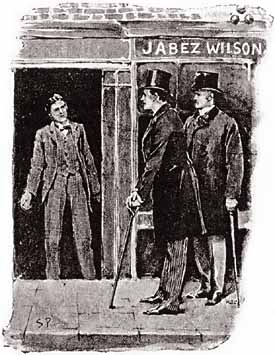| The Red-headed League 6 | The Red-headed League 7 |
“Well, Watson,” said Holmes when our visitor had left us, “what do you make of it all?”
“I make nothing of it,” I answered frankly. “It is a most mysterious business.”
“As a rule,” said Holmes, “the more bizarre a thing is the less mysterious it proves to be. It is your commonplace, featureless crimes which are really puzzling, just as a commonplace face is the most difficult to identify. But I must be prompt over this matter.”
“What are you going to do, then?” I asked.
“To smoke,” he answered. “It is quite a three pipe problem, and I beg that you won’t speak to me for fifty minutes.” He curled himself up in his chair, with his thin knees drawn up to his hawk-like nose, and there he sat with his eyes closed and his black clay pipe thrusting out like the bill of some strange bird. I had come to the conclusion that he had dropped asleep, and indeed was nodding myself, when he suddenly sprang out of his chair with the gesture of a man who has made up his mind and put his pipe down upon the mantelpiece.

“Sarasate plays at the St. James’s Hall this afternoon,” he remarked. “What do you think, Watson? Could your patients spare you for a few hours?”
“I have nothing to do to-day. My practice is never very absorbing.”
“Then put on your hat and come. I am going through the City first, and we can have some lunch on the way. I observe that there is a good deal of German music on the programme, which is rather more to my taste than Italian or French. It is introspective, and I want to introspect. Come along!”
We travelled by the Underground as far as Aldersgate; and a short walk took us to Saxe-Coburg Square, the scene of the singular story which we had listened to in the morning. It was a poky, little, shabby-genteel place, where four lines of dingy two-storied brick houses looked out into a small railed-in enclosure, where a lawn of weedy grass and a few clumps of faded laurel-bushes made a hard fight against a smoke-laden and uncongenial atmosphere. Three gilt balls and a brown board with “JABEZ WILSON” in white letters, upon a corner house, announced the place where our red-headed client carried on his business. Sherlock Holmes stopped in front of it with his head on one side and looked it all over, with his eyes shining brightly between puckered lids. Then he walked slowly up the street, and then down again to the corner, still looking keenly at the houses. Finally he returned to the pawnbroker’s, and, having thumped vigorously upon the pavement with his stick two or three times, he went up to the door and knocked. It was instantly opened by a bright-looking, clean-shaven young fellow, who asked him to step in.

“Thank you,” said Holmes, “I only wished to ask you how you would go from here to the Strand.”
“Third right, fourth left,” answered the assistant promptly, closing the door.
“Smart fellow, that,” observed Holmes as we walked away. “He is, in my judgment, the fourth smartest man in London, and for daring I am not sure that he has not a claim to be third. I have known something of him before.”
“Evidently,” said I, “Mr. Wilson’s assistant counts for a good deal in this mystery of the Red-headed League. I am sure that you inquired your way merely in order that you might see him.”
“Not him.”
“What then?”
“The knees of his trousers.”
“And what did you see?”
“What I expected to see.”
“Why did you beat the pavement?”
“My dear doctor, this is a time for observation, not for talk. We are spies in an enemy’s country. We know something of Saxe-Coburg Square. Let us now explore the parts which lie behind it.”
The road in which we found ourselves as we turned round the corner from the retired Saxe-Coburg Square presented as great a contrast to it as the front of a picture does to the back. It was one of the main arteries which conveyed the traffic of the City to the north and west. The roadway was blocked with the immense stream of commerce flowing in a double tide inward and outward, while the foot-paths were black with the hurrying swarm of pedestrians. It was difficult to realize as we looked at the line of fine shops and stately business premises that they really abutted on the other side upon the faded and stagnant square which we had just quitted.
“Let me see,” said Holmes, standing at the corner and glancing along the line, “I should like just to remember the order of the houses here. It is a hobby of mine to have an exact knowledge of London. There is Mortimer’s, the tobacconist, the little newspaper shop, the Coburg branch of the City and Suburban Bank, the Vegetarian Restaurant, and McFarlane’s carriage-building depot. That carries us right on to the other block. And now, Doctor, we’ve done our work, so it’s time we had some play. A sandwich and a cup of coffee, and then off to violin-land, where all is sweetness and delicacy and harmony, and there are no red-headed clients ” to vex us with their conundrums.
| The Red-headed League 6 | The Red-headed League 7 |